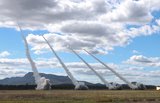Australia looks towards space with force restructure, investment and training
Australia is looking to improve its presence in space with a focus on communications and creating a dedicated segment of its defence forces committed to the domain.
Thales and the Dutch Defence Cyber Command (DCC) have entered into a contract to build a cyber defence training and testing facility called the Cyber Range, the company announced on 3 May.
The facility will enable the simulation of cyber-attacks and incidents as well as defence and protective mechanisms on various weapon systems, satellite links or IT environments. Offensive cyber tactics will also be tested. The facility will have a scalable virtual environment that can be frozen during training or an exercise for reviewing, inspecting, evaluating and analysing scenarios.
The facility will support small-scale and large-scale exercises and training, and will be linked to mobile applications and other systems. The agreement will see Thales provide support for the coming three years.
There is also potential to link the Cyber Range with other facilities and labs to enable collaboration within the DCC; and on a national scale with other knowledge centres and ministries, to enable international collaborations in large-scale cyber exercises.
Brigadier General Hans Folmer, commander, DCC, said: 'The Cyber Range is an important step for the DCC. It is a facility in which many forms of cyber operations can be simulated. This is essential to train our staff and to test our systems.'

Australia is looking to improve its presence in space with a focus on communications and creating a dedicated segment of its defence forces committed to the domain.

The Portuguese company’s naval communications system is in service across more than a dozen countries. It has turned to its home nation for support in developing a new vehicle based C2 system.

The Vision4ce Deep Embedded Feature Tracking (DEFT) technology software is designed to process video and images by blending traditional computer vision with artificial intelligence (AI) algorithms to present actionable information from complex environments.

Persistent Systems has been cleared by National Security Agency (NSA) to transmit sensitive data on commercial networks. The devices are added to the NSA’s Commercial Solutions for Classified (CSfC) component list which also includes other companies’ products providing the same security.

The release of the UK’s Strategic Defence Review (SDR) has been long promised as mid-year. It is possible it could be as early as 2 June although the UK Ministry of Defence (MoD) continues to play its cards close to its chest.

Intelsat outlines how its multi-orbit SATCOM architecture is enhancing connectivity and resilience for special operations forces operating in degraded and contested environments.